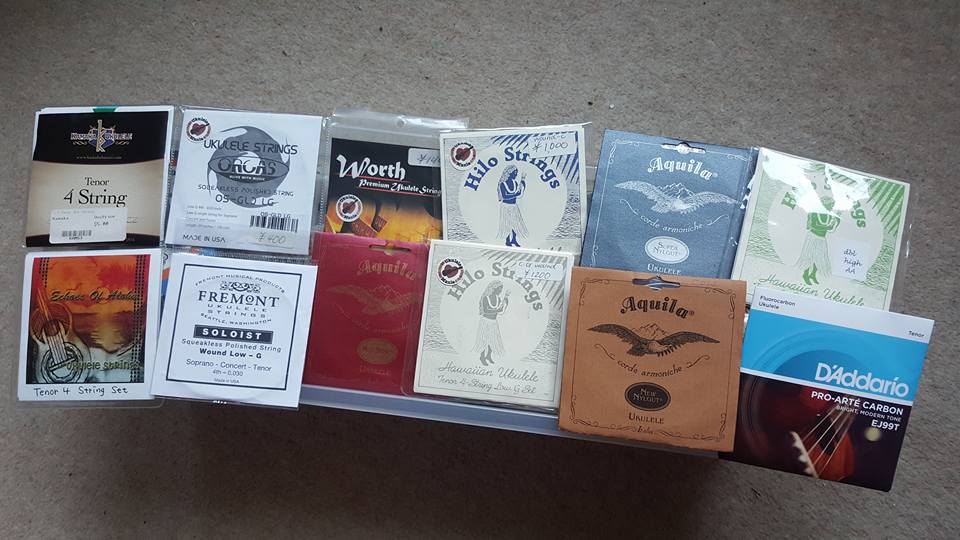I’m discovering that in the ukulele world there are lots of opinions about ukulele strings and which ones to select. At one extreme some folks insist that “brand X” is “the best string choice”, while others insist on simply going down to the local fishing store and getting some fishing line! Let me be clear in my view there are no “best strings” just different. Some folks seem to relish the idea of never changing strings and feel quite confronted by the every idea that maybe, just maybe the string choice might me one of the elements that determines who the instrument sounds, just a thought… As someone who is interested in this area, to date I have tested over 12 different string types across two dozen instruments with many surprising results…
Call me picky, BUT I would respectfully suggest that some of the following elements are worthy of some consideration BEFORE making any definitive statement about this matter.
- What type of ukulele is being played – yes size matters – an 8 string bari is different to a soprano
- What’s the ukulele made of? Different woods can make for very different sounds
- How does the instrument sound acoustically and’or with a pickup?
- What sound do you want? This can of course be very subjective…
- Is the ukulele being played as a solo instrument, duo setting or in a band? Different sonic considerations here
- Different people hear differently and 80 quid uke also is often going to respond differently to an 800 quid uke
- Only by exploring and comparing (if that is an interest) can anyone really talk about this from actual experience
Some people are interest in the sonic possibilities of what the ukulele can do and others are not that bothered. I respect both views. That said its in my totally biased opinion to make proclamations on any matter without any actual information or exploration. It would be like trying a local pizza takeaway and then using this snapshot experience to pronounce on Italian cuisine!
My own experience in trying out a dozen or more strings types across two dozen ukuleles is that the string choice can make a big difference in how an instrument sounds and feels. I have a collection of ukuleles which are very wide ranging from my recent 1920’s Martin acquisition, to some great custom made Shimo instruments to everything in between. Wound strings (often G and C) make for a radically different sound and I have yet to find any wound fishing line…lol Its about personal choice as there are no best strings, just different…
I have been conducting some testing with a Cocobolo super soprano ukulele in what I call “The Kitchen string test” Here I test the exact same ukulele in the same acoustic space, recorded with the same gear, playing the same piece of music. Its blinding obvious to me that there’s a huge difference when changing the strings, both in how the instrument responds, how it sounds from the artist perspective and how it sounds from the audience’s perspective which of course is different.
Of course many seasoned professional musicians have long realised that this is a factor in the final sound. Stevie Ray Vaughan experimented a great deal and dazzled audiences with his music. His spirit of exploration was not only in the gear he used, but in his whole approach to musical performance, see https://www.stringjoy.com/stevie-ray-vaughans-guitar-string-gauges/ My good friend Martin Simpson similarly has an attitude of exploration and experimentation. I’m seeing him next week and will take the new Martin uke to show him. Martin is also a terrific example of somebody always questions what else is possible, never settling just for a common view. When I interviewed Bill Collings in Austin Texas and Takahiro Shimo in Tokyo, both brilliant instrument builders had the same attitude of exploration and experimentation. This also goes for many of my favorite musical artists. They are always seeking out new possibilities and I applaud such thinking.
Ultimately its all about personal choice and attitude. Personally as you may have figured by now, I am a fan of exploration and that’s one of the reasons I set up the OUS platform, which is about creating something new. I have the same view in terms of exploring how different instrument combinations, including string options can provide some really interesting results. I also respect that such exploration and experimentation is not for everyone and that’s fine too of course.

Strings are a wide topic on any stringed instrument. I agree that there are many reasons to try something new. I find once I have found something that works I stick with it. This is because I like to know my insteument will be great when I pick them up. On steel string acoustic I use elixir strings, on electric bass I use elixir, on ukulele I use Aquila Nylgut strings. Living in New Zealand we don’t have such a wide variety of choice when it comes to ukulele strings.
Once I tried aquila red strings on my soprano and they were no good. When they first went on they sounded horrible, to chingy and blugh. I thought I would give them time to settle in. So I kept them on and played it everyday. They never held there tune that well. I always disliked playing that uke but kept with it after a month of these strings I put the old aquila nylgut strimgs back on and wow instant happiness and joy again. Talking to a few people who have tried aquila red strings, on a range of different ukes, they also had similar results just bad.
I like your post and agree with what you say. It’s not all black and white.
Its a fascinating area and as you say there are many shades of grey! A change of strings can literally transform an instrument